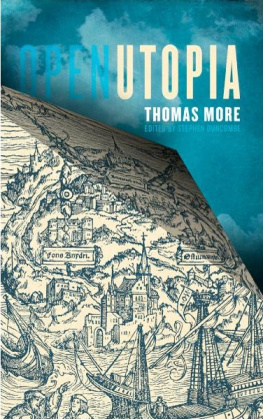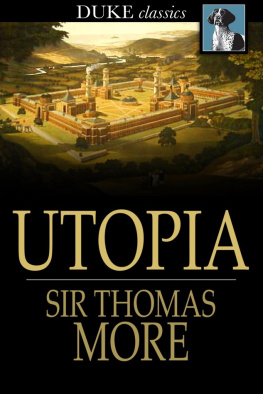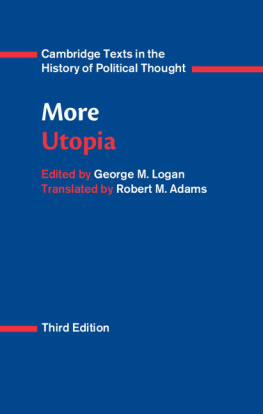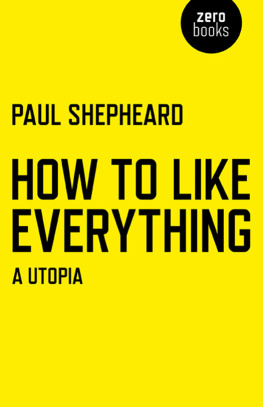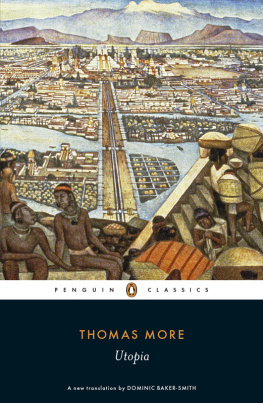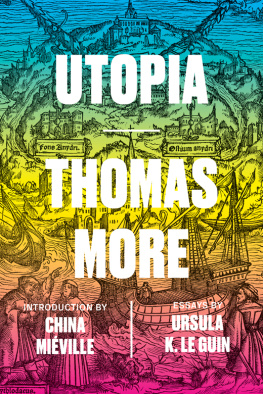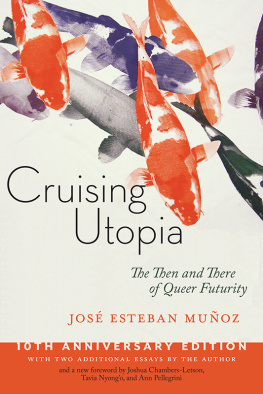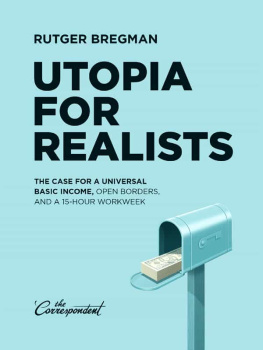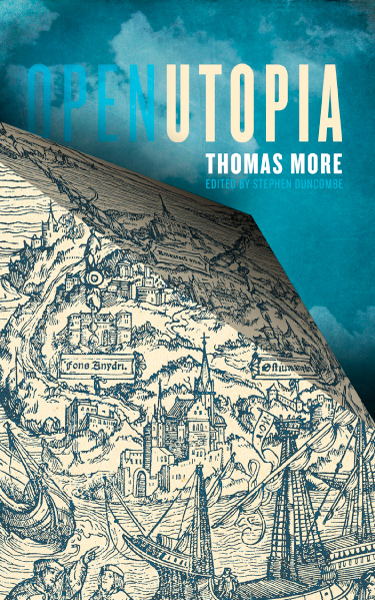[Open] Utopia
Thomas More
Edited and Introduced by Stephen Duncombe
Table of Contents
Preface: Intellectual Commons
in Utopia, where every man has a right to everything, they all know that if care is taken to keep the public stores full no private man can want anything
Does the world really need another edition of Thomas Mores Utopia? Kept in print more or less continuously since it was first published in 1516, the translations and editions of this book, not to mention the scholarly interpretations and academic dissertations based upon this slender volume, would likely constitute the mass of a medium-sized island in themselves. It takes a bit of audacity to introduce yet another version of Utopia. Yet I have done so here because what the world does not have, and what I believe it needs, is a complete English-language translation of Utopia that honors the primary precept of Utopia itselfthat is, that all property is common property.
This digital edition of Utopia is open: open to read, open to copying, open to modification. On this site Utopia is presented in different formats in order to enhance this openness. If the visitor wishes to read Utopia online they can find a copy. If they want to download and copy a version, Ive provided links to do so in different formats for different devices. In partnership with The Institute for the Future of the Book I provide an annotatable and social text available for visitors to comment upon what More or I have written, and then share their comments with others. Those who like to listen will find a reading of Utopia on audio files, and those who want to watch and look can browse the user-generated galleries of Utopia-themed art and videos. For people interested in creating their own plan of an alternative society, Ive created Wikitopia, a wiki with which to collaborate with others in drafting a new Utopia. More versions for more platforms are likely to be introduced in the future.
The Open Utopia is assembled from translations and editions of Mores Utopia that are in the public domain. The Preface, Introduction and footnotes, written by me, are licensed under Creative Commons, as are the few new translations I commissioned especially for this volume. The Creative Commons by-sa license allows users to freely use, study, copy, share, and modify the work, as long as attribution is given and the content remains free to share. (The complete ancestry of the Open Utopia can be found under .)
The Open Utopia is a complete edition, meaning that I have included all of the letters and commendations, as well as the marginal notes, that were included in the first four printings of 1516-18 in which More himself had a hand. Non-scholarly editions of the book often omit this material, but I believe these letters and notes, written by the author and his friend among the European literati, are essential for understanding what More was doing in and with his Utopia. (The first-time reader, however, can comfortably skip ahead to Book I and Book II first, backtrack through the letters More wrote to Peter Giles that lie on either side, and then wander at their leisure through the other letters, commendations and marginal notes.) I have also supplied a cast of contributors and copious footnotes of my ownnot to bog the reader down with the intricacies of academic debates, but to give historical, literary and etymological context, providing the twenty-first-century reader with the information that Mores learned sixteenth-century audience was likely to know.
Thomas Mores Utopia is more than the story of a far-off land where there is no private property. Its a text that instructs us how to approach texts, be they literary or political, in an open manner: open to criticism, open to participation, open to modification, and open to re-creation. Ive done my best with the Open Utopia to convey this message and continue the tradition.
Onward to Utopia!
Stephen Duncombe
No-Place 2012
Introduction
Today we are people who know better, and thats both a wonderful and terrible thing.
Sam Green, Utopia in Four Movements,
Utopia is a hard sell in the twenty-first century. Today we are people who know better, and what we know are the horrors of actually existing Utopias of the previous century: Nazi Germany, Stalins Soviet Union, Maoist China, and so on in depressing repetition. In each case there was a radical break with the present and a bold leap toward an imagined future; in every case the result was disastrous in terms of human cost. Thankfully, what seems to be equally consistent is that these Utopias were relatively short-lived. History, therefore, appears to prove two things: one, Utopias, once politically realized, are staggering in their brutality; and two, they are destined to fail. Not exactly a ringing endorsement.
Yet we need Utopia more than ever. We live in a time without alternatives, at the end of history as Frances Fukuyama would have it, when neoliberal capitalism reins triumphant and uncontested. There are still aberrations: radical Islam in the East, neo-fascist xenophobia in the West, and a smattering of socialist societies struggling around the globe, but by and large the only game in town is the global free market. In itself this might not be so bad, except for the increasingly obvious fact that the system is not working, not for most people and not most of the time. Income inequality has increased dramatically both between and within nations. National autonomy has become subservient to the imperatives of global economic institutions, and federal, state, and local governance are undermined by the protected power of money. Profit-driven industrialization and the headlong rush toward universal consumerism is hastening the ecological destruction of the planet. In short: the world is a mess. Opinion polls, street protests, and volatile voting patterns demonstrate widespread dissatisfaction with the current system, but the popular response so far has largely been limited to the angry outcry of No! No to dictators, No to corruption, No to finance capital, No to the one percent who control everything. But negation, by itself, affects nothing. The dominant system dominates not because people agree with it; it rules because we are convinced there is no alternative.
Utopia offers us a glimpse of an alternative. Utopia, broadly conceived, is an image of a world not yet in existence that is different from and better than the world we inhabit now. For the revolutionary, Utopia offers a goal to reach and a vision to be realized. For the reformer, it provides a compass point to determine what direction to move toward and a measuring stick to determine how far one has come. Utopia is politically necessary even for those who do not desire an alternative society at all. Thoughtful politics depend upon debate and without someone or something to disagree with there is no meaningful dialogue, only an echo chamber. Utopia offers this other, an interlocutor with which to argue, thereby clarifying and strengthening your own ideas and ideals (even if they lead to the conclusion that Utopia is undesirable). Without a vision of an alternative future, we can only look backwards nostalgically to the past, or unthinkingly maintain what we have, mired in the unholy apocalypse that is now. Politically, we need Utopia.
Yet there are theoretical as well as practical problems with the project. Even before the disastrous realizations of Utopia in the twentieth century, the notion of an idealized society was attacked by both radicals and conservatives. From the Left, Karl Marx and Frederick Engels famously criticized Utopians for ignoring the material conditions of the present in favor of fantasies of a futurean approach, in their estimation, that was bound to result in ungrounded and ineffectual political programs, a reactionary retreat to an idealized past, and to inevitable failure and political disenchantment. Ultimately, they wrote in

